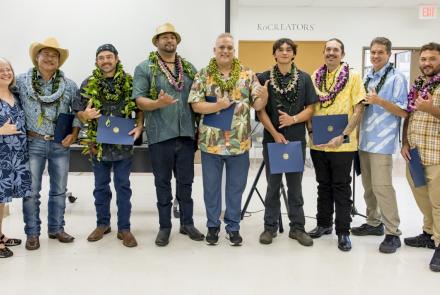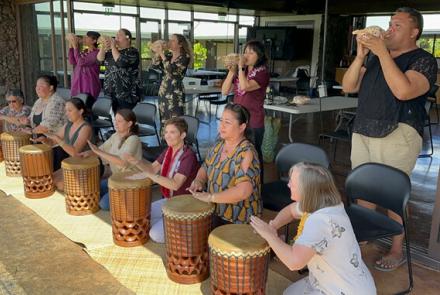WITH NEW EQUIPMENT AND REVISED CURRICULUM, ELECTRONICS TECHNOLOGY PROGRAM UNDERGOES BIG CHANGES
The Electronics Technology program at Hawai‘i Community College is undergoing big changes. There is new equipment, a revised curriculum, exciting projects and renovation work has just begun on the Electronics classroom and lab.
“So the emphasis in the program has been changed to be more industrial,” said Electronics Instructor Bernard “Chip” Michels. “So the whole idea here is to focus more on the telecommunications and on the process and controls arena, or automation.”
It's all part of an effort to give Electronics students the skills they need to succeed in today's job market.
“The way Chip runs it is starting with the fundamentals,” says Jack Anderson, who is a student in the Electronics program. “So you've got all the components like transistors and integrated circuits, and as we build through the program you go into the applications like telecommunications, the things that make our cell phones and internet connections work. But it's also the industrial side of things, so your power and water utilities. It's all covered and controlled by electronics.”
Efforts to modernize the program have been helped with a $96,000 grant that was used to purchase new equipment.
“We're using state-of-the-art, we're using what's very much out in the field right now,” says Michels.
Special projects give students exciting ways to apply their newfound knowledge. For example, several students recently helped build a robot and went to Florida to compete in the 2017 NASA Robotic Mining Competition.
“Really fun time,” says Anderson. “Flew over to Kennedy Space Center to do that project.”
Students are currently working on a project with the Hawai‘i Community College Agriculture program to automate the program's greenhouse irrigation system.
“I believe that the knowledge and skills they learn here can be applicable anywhere,” says Michels. “And that is my goal, to make them a little more universal, and if you want to work for HELCO, hey, you can do SCADA, it won't be out of your realm. Or if you want to work for let's say someone like Pacific Wireless, it won't be out of your realm, you'll be used to the terminology and some of the ideas that they'll be implementing.”
Some graduates of the electronics program also transfer to four-year campuses like the University of Hawai'i at Hilo to earn their bachelor's degree.
"The upper campus runs a Computer Science program, so I'm going to transfer there and finish my undergraduate," says Anderson.





